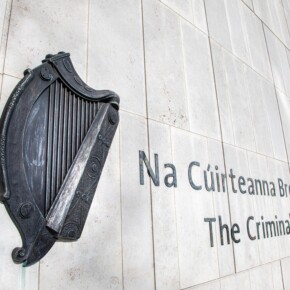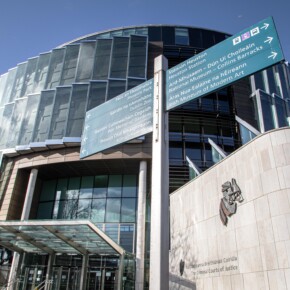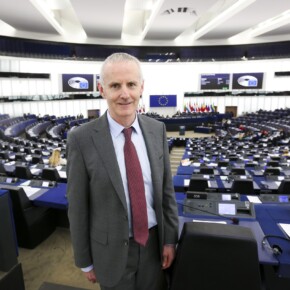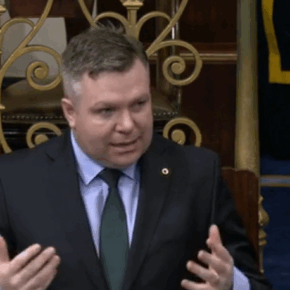Coolock’s week of chaos
Mike Finnerty 24 Jul 2024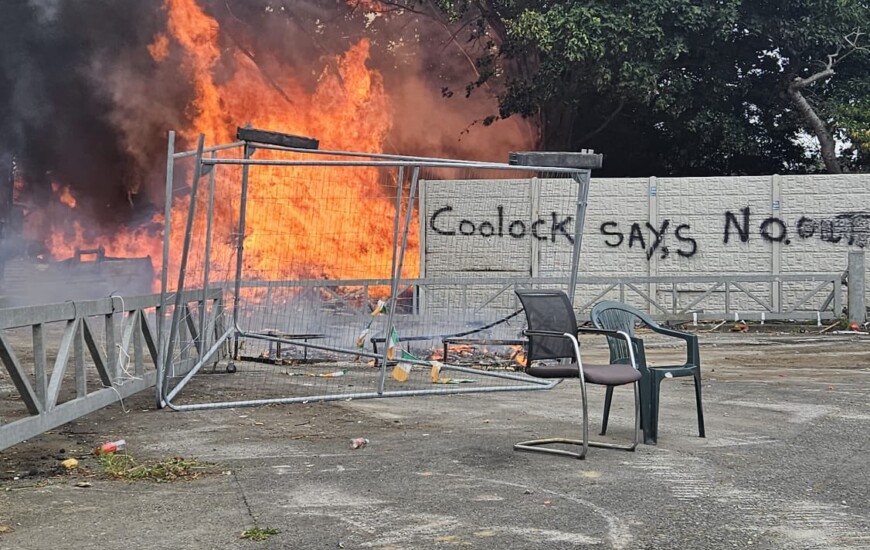
Tensions surrounding immigration in Coolock reached boiling point on Monday, July 15th, with over twenty people charged for public order offences.
The disused Crown Paints factory in Malahide Road has been designated as a building to house over 500 asylum seekers.
The Department of Integration confirmed that the building had been earmarked for use by the government.
The building was targeted by an arson attack late Thursday evening (July 18), and while the building wasn’t badly damaged, it required gardaí to remain at the scene overnight.
Further arson attacks took place at the factory over the weekend, necessitating gardaí and security guards to be placed at the site.
On Monday, July 15th, over twenty people were charged after anti-immigration protests turned violent, with numerous individuals associated with the Irish far-right descending on Coolock to protest the centre.
Anti-immigrant independent councillor Gavin Pepper was present at the protests, claiming that Garda commissioner Drew Harris planned the riot.
“These communities are saying no, they’re worried about their children, and they’re worried about the safety of the community,” Pepper said in a video posted on Twitter.
He said that the government are “looking for civil unrest in this country.”
Other anti-immigrant politicians elected in June, including independent North Inner City councillor Malachy Steenson and elected reps from the far-right National Party and Irish Freedom Party were present at the scene.
A digger that had been brought in to work on the site was set on fire by protesters, and a security guard that was hired to watch over the site was injured in an attack and brought to hospital.
A special sitting of the Dublin District Court on Monday evening charged over a dozen individuals with public order offences and were commanded by the courts to stay away from the site ahead of further sentencing in September.
On Tuesday, July 16th, international protection applicants who were camping on City Quay were attacked by a group carrying knives and pipes, with tents being slashed and thrown into the River Liffey and their documentation destroyed or thrown into the river.
A number of properties earmarked for use by asylum seekers have been hit by arson attacks in Dublin in recent times, with a disused pub in Ringsend being burned out on New Year’s Eve, and two asylum seeker centres in Finglas and on Parnell Square were targeted during last November’s Dublin riots.
The scenes in Coolock follow similar acts of violence in Newtownmountkennedy in County Wicklow in April, which also saw numerous arrests and gardaí declaring public order incidents after anti-immigrant protesters instigated violence.
Condemnation of the violence followed the incident in Coolock, with Taoiseach Simon Harris describing the violence as “utter thuggery.”
“No person has a right to burn cars, damage property or attack members of An Garda Siochana and emergency services.”
“These actions are criminal and are designed to sow fear and division; we should not accept them being legitimised in any way by describing them as ‘protest”.
Sinn Féin councillor Mícheál Mac Donncha dubbed the violence as “deplorable.”
The Donaghmede councillor said the violence in the area was an effort “to spread fear and hate” and that the “vast majority of decent people want nothing to do with it.”
He said that people who have concerns over the issue should raise it “peacefully and democratically.”
“Violence, intimidation and arson have no place in our communities,” he said.
“Everyone deserves respect, including men, women and children due to be accommodated at this site.”
“Equally, we need to see constructive engagement with communities to ensure that all necessary facilities are in place for both the local population and those accommodated in the centre.”
Mac Donncha’s Sinn Féin colleague Daithí Doolan told RTÉ that an individual involved in the protests has “political pedigree” through past involvement with the far-right British National Party.
The protests received the support of far-right British political activist Tommy Robinson, with Robinson tweeting “Rise Ireland, Rise” in support of the protests.
He said that the unnamed individual, who is known to authorities, is a convicted drug dealer and had previously boasted of “flooding Ireland with drugs.”
People Before Profit councillor Conor Reddy said “there is nothing patriotic or rebellious about attacking workers, intimidating people or getting backing from racists overseas.”
Minister for Justice Helen McEntee said she was “appalled at the criminal behaviour that took place in Coolock.”
“People engaged in such acts will face the full rigours of the law,” she said.
Labour MEP Aodhán Ó Ríordáin said the situation in Coolock was “domestic terrorism.”
He said it was “absolutely disgusting that people’s lives have been endangered in this way” following reports of the fire on Thursday evening.
“It’s domestic terrorism; call it for what it is.”
Social Democrats leader Holly Cairns said, “government’s failure to comply with Ireland’s legal obligations to provide accommodation for those seeking international protection has led to a situation where asylum seekers are putting their safety at risk by being forced to live in tents on our streets.
“They are not there by choice – they simply have nowhere else to go.”
“The coarsening of the debate around immigration is leading to increased attacks on migrant communities, as we also saw in Coolock this week. Such criminal behaviour is abhorrent to the majority of decent people in this country and must be confronted head-on by the Minister for Justice and Garda Commissioner.”
Minister for Integration and new Green Party leader Roderic O’Gorman told RTÉ “the need to deal with far-right activists and violent situations has grown very suddenly in the last two years.”
O’Gorman dismissed claims that his department had failed to engage with locals on the issue.
He said that local elected reps and local community representatives held a meeting on the topic in April, and “detailed briefing documents” were distributed locally.
“Very detailed information was in the public domain for a considerable time.”


